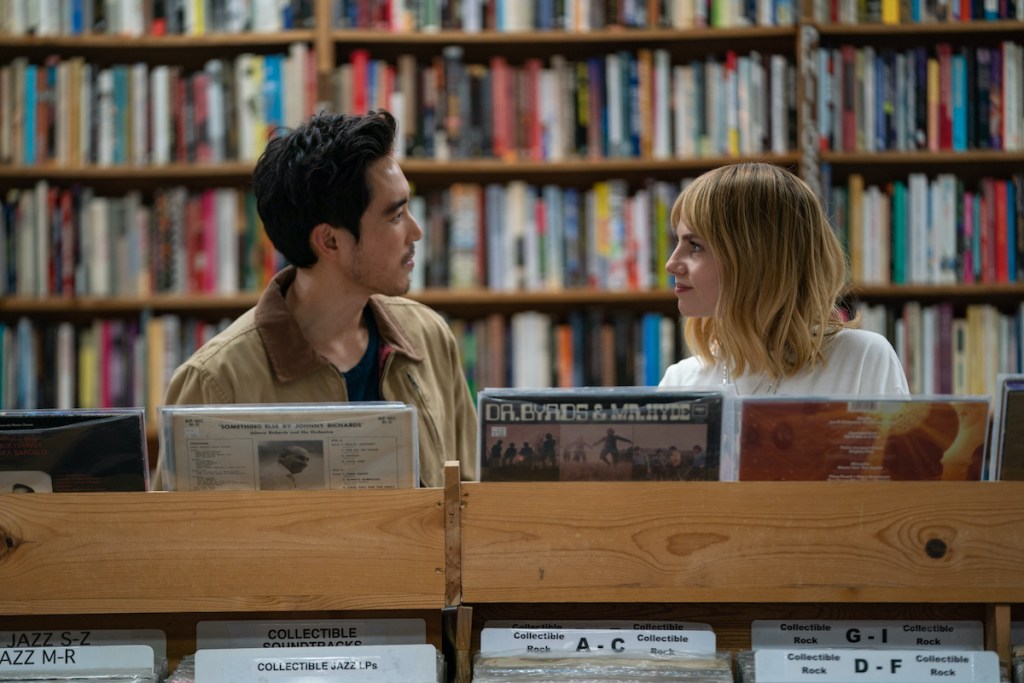
It’s one of the great cliches; the song that takes you back. Some songs have the ability to bring you back to a moment in time, whether it be your first kiss or your first heartbreak.
Of course, no one ever means that literally. But what if they did?
“The Greatest Hits,” written and directed by Ned Benson, literalizes that feeling of nostalgia to the nth degree. Following the sudden death of her boyfriend Max (David Corenswet), Harriet (Lucy Boynton) not only has to deal with the emotional fallout of her tragic loss, but unforeseen magical consequences as well.
When Harriet discovers that certain songs that hold a special place in the trajectory of her and Max’s relationship have the power to transport her mind back in time, allowing her to relive those moments for the length of the song in question, she becomes fixated on this new, uncontrollable power – not only obsessed with the idea of hanging out with Max every chance she gets, but with the idea of figuring out a way to change the past so that Max never dies in the first place. But when she meets David (Justin H. Min), her insistence on changing the past starts to clash with the promise of a new future.
“The Greatest Hits” not only investigates the power of nostalgia, but deals quite heftily in its own nostalgic feel as well. There’s an old school sensibility to the film’s strengths, particularly in the way its characters use their pop culture references to communicate their feelings – seriously, some exchanges feel straight out of a “Dawson’s Creek” episode, and I mean that in the best way possible. But despite the charming banter and the chemistry between the leads, “The Greatest Hits” loses itself in its magical realism, so much so that its strongest themes end up lost in the shuffle.
In a typical love triangle, you usually end up liking one point of that triangle more than the other, at least where a romantic relationship is concerned. But “The Greatest Hits” does not feature the typical version of this trope, and one of its biggest strengths is that the chemistry between both Harriet and Max and Harriet and David is equally charming. In a movie like this – one where the main character has burrowed down as depressive a rabbit hole as Harriet has – it’s important for the audience to understand why Harriet is so intent on living in the past, particularly when someone like David could be in her future. Benson’s writing in the film’s first couple of acts gives both couples a leg to stand on in the form of some pretty adorable meet cutes, but it’s the emotional connection between the actors that really sells the love stories.
For a movie that rests on the power of music, the music choices themselves can be hit or miss, but the choices that work really work. Harriet spends her nights searching for the song that will take her back to the moment of Max’s death, hoping that she can save him. That search also leads her to discover a slew of other song and moment combinations, as well as songs that don’t shoot her into a timewarp at all. It’s the latter group that she marks “safe,” as in songs that she can hear in public without the fear of magic taking hold. One of these songs is Nelly Furtado’s “I’m Like a Bird,” which is featured in a lovely scene where Harriet and David listen to the song in David’s car, wind whipping through their hair and singing at the top of their lungs. It’s a wonderful song choice for the moment – “I’m Like a Bird” might not be the best song, or the coolest song, but it is a song nearly everyone knows. It’s the perfect song to represent the feeling of safety that Harriet has in that moment, her thoughts clear of Max and focused on the euphoria that comes with singing along to the radio with someone you care about. There’s a freedom in the song, and for Harriet that’s the freedom to move on.
For the majority of its runtime, this is what “The Greatest Hits” attempts to explore – how past relationships shape you and how difficult it can be to leave the past behind. While Harriet suffered a great tragedy, the relationship she had with Max was real, and loving, and meant something. The simple fact of moving on doesn’t negate the importance he held in her life. But the film’s third act takes a sudden left turn that prioritizes the realities of the film’s magical realism over the tenderness and heartbreak of its major themes. Suddenly, under the weight of magic, the film stops being about the strength it takes to move on and becomes more about sacrifice. That switch in concept snaps the strengths of “The Greatest Hits” in two, making the audience (or at least, this audience) more remorseful for what was lost rather than hopeful for what was gained.
